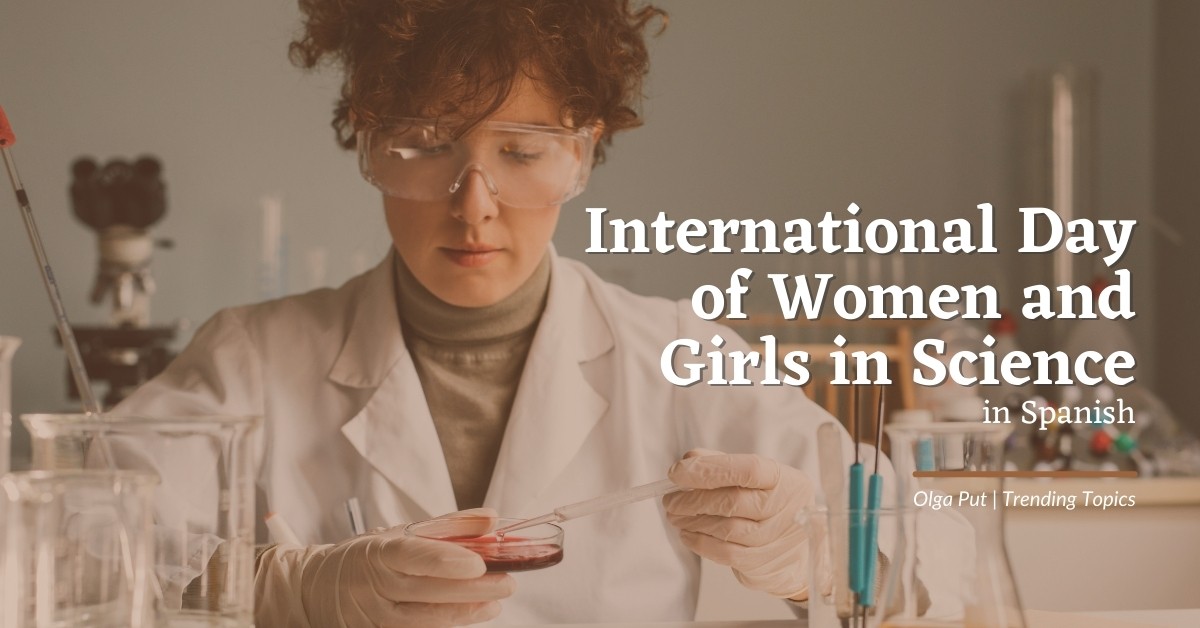
International Day of Women and Girls in Science in Spanish
Today is the International Day of Women and Girls in Science. Why do we need to make a special day to celebrate it? What’s there to celebrate? How did it all start?
If you think “scientist” what image comes to your mind? How many women scientists can you mention right now? Are men more naturally inclined toward scientific studies? Are there any degrees that suit women better? What do you think of a woman engineer in the petrol or mining industry?
Keep reading for the answers to the above questions and to discover how some Spanish-speaking countries celebrate el Día Internacional de la Mujer y Niña en la Ciencia. Plus, I’ve included a list of STEM-related Spanish words so that you can read and talk about science, technology, engineering, and math in Spanish.
Origin and Importance of the International Day of Women and Girls in Science
It wasn’t without a struggle that women started acquiring rights. In 1977, the United Nations General Assembly invited its members to celebrate women’s rights on March 8th.
Still, almost 40 years later, in 2015, it was clear that equality had not been fully accomplished. A key field where men outnumbered women significantly was science. Less than 30% of researchers were women, and only about 30% of students earning STEM-related degrees were women.
And do you know what was the percentage of female enrollment in information and communications technology (ICT)? 3%! Natural science, mathematics, and statistics? 5%! Engineering, manufacturing, and construction? 8%!
Why? Worldwide biases, prejudices, and gender stereotypes, both in real life and on-screen.
It was time to start a dialogue about the issue and do something about it. The UN declared February 11 as the International Day of Women and Girls in Science. International days like this one aim to educate people on issues of concern, motivate politicians to act, and use resources to address global problems.
Why is it important? Men and women are equal but different. If women and girls constitute 50% of the global population, their participation in scientific discoveries should be equally represented. The world needs more women and girls in science.

How is International Day of Women and Girls in Science Celebrated?
Unfortunately, this year, all the celebrations have been affected by the COVID-19 pandemic, like everything else in our lives. Most of the events moved online. The advantage of virtual life is that now it’s easy to participate in events all over the world, whether it’s in Colombia, Ecuador, México, Guatemala, or Spain.
Let’s see how El Día Internacional de la Mujer y Niña en la Ciencia has been celebrated in some Spanish-speaking countries.
Spain
Spain has been at the forefront of promoting and celebrating women in science for a long time. This year, you can find institutions and events promoting #mujeresenciencia in most of its autonomous communities.
Last year, Universidad Autónoma de Madrid, asked almost 300 girls and women of 20 nationalities to send a video talking about things they liked about physics.
This year, with the campaign ·YoutubersPorUnDia (Youtubers for a Day) they are inviting boys and girls to send videos or drawings or crafts inspired by a discovery made by a woman in physics or math. (See the results on the IFT channel.)
Find more information and fliers in simple Spanish about women scientists and researchers here.
Colombia
In Colombia, you can join in the III Encuentro Colombiano de la Mujer y la Niña en la Ciencia (3rd Colombian Meeting of Women and Girls in Science). The events is from February 9-12 on virtual platforms. Mars is the guest of honor!
Check out the interactive agenda. It’s free to participate and a great opportunity to practice your Spanish!
Ecuador
Ecuador is taking big strides in celebrating the International Day of Women and Girls in Science.
@Divulgaciencia and @OEI Ecuador are dedicating the month to talk about #mujeresenciencia (women in science). This year, the country hosts El I Encuentro Internacional de Mujeres y Niñas en las Ciencias (The First International Meeting of Women and Girls in Science) organized by El Museo Interactivo de la Ciencia (MIC) and la Red Ecuatoriana de Mujeres Científicas.
The event is from February 9-13, and you can sign up for free by simply filling in a form in Spanish.
Argentina
Dirección General de Escuelas en Argentina has published a series of interesting articles for girls to celebrate the International Day of Women and Girls in Science.
Read the articles online, sign up for a programming club, and download two books in Spanish: Mi Científica Favorita and Mi Científica Favorita II.
Spanish STEM vocabulary
How about reviewing some Spanish vocabulary related to science, technology, engineering, and mathematics? Let’s see how many of them you’re already familiar with.
Science-Related Vocabulary
Let’s start with words related to life science, physical science, and earth and space science:
Life Science
| Spanish | English |
| el organismo | organism |
| la célula | cell |
| el tejido | tissue |
| el órgano | organ |
| el gen | gene |
| el ADN (ácido desoxirribonucleico) | DNA |
Physical Science
| Spanish | English |
| la energía | energy |
| la materia | matter |
| el átomo | atom |
| el sonido | sound |
| la densidad | density |
| el volumen | volume |
Earth and Space Science
| Spanish | English |
| la Tierra | Earth |
| la placa tectónica | the tectonic plate |
| los planetas | planets |
| el sistema solar | solar system |
| el agujero negro | black hole |
| la Vía Láctea | the Milky Way |
Technology-Related Vocabulary
This vocabulary is useful when traveling in Spanish-speaking countries. If you have any problems with the Internet or your devices, you can always refer to these terms to get you through.
Computers
| Spanish | English |
| la computadora (lat.am.), el ordenador | computer |
| laptop (lat. am.), el portatil | laptop |
| la pantalla | monitor / screen |
| el teclado | keyboard |
| el disco duro | hard drive |
| los altavoces | speakers |
| Internet | |
| la conexión al internet | internet connection |
| la velocidad | speed |
| la banda ancha | broadband |
| la red | network |
| arroba | @ |
| el enlace | link |
Cell Phones
| Spanish | English |
| el celular / móvil | cell phone |
| el paquete de internet | data plan |
| la cobertura | coverage |
| la contraseña | password |
| la aplicación / la app | app |
| una llamada internacional | international phone call |
Engineering-Related Vocabulary
| el ingeniero | engineer |
| diseñar | design |
| producir | to produce |
| el químico | chemical |
| eléctrico | electrical |
| mecánico | mechanical |
| montar | assemble |
| la prueba | test |
| medir | to measure |
| calcular | to calculate |
| la longitud | length |
| el ancho | width |
| el alto | height |
| la fuerza | force |
Math-Related Vocabulary
Math Subjects
| Spanish | English |
| aritmética | arithmetic |
| matemáticas | mathematics |
| álgebra | algebra |
| cálculo | calculus |
| estadística | statistics |
| geometría | geometry |
| física | physics |
| trigonometría | trigonometry |
| la calculadora | calculator |
Basic Math
| Spanish | English |
| suma | addition |
| resta | subtraction |
| multiplicacón | multiplication |
| división | division |
| ecuación | equation |
| más | plus |
Math Terminology
| Spanish | English |
| la calculadora | calculator |
| el número par | even number |
| el número impar | odd number |
| el porcentaje | percentage |
| la fracción | fraction |
| la cantidad | quantity |
Have you noticed how many STEM-related words in Spanish look similar to English words? They are called cognates. If you want to get to know more cognates in Spanish, check out Easy Cognates for the Beginning Spanish Learner.
Now you’re ready for academic conversations in the STEM field or to attend conferences and events for the International Day of Women and Girls in Science in Spanish!
Practice your STEM skills and STEM Spanish Language
Why not sign up for a free class with one of our friendly, native-speaking teachers from Guatemala to talk about the International Day of Women and Girls in Science? You can use your STEM vocabulary and talk about your skills and interests related to this field.

Want more Spanish resources and fun content? Check these out!
- Celebrating Culture and Joy: The Magic of Carnival in Spanish-Speaking Countries
- 15 Mouth-Watering National Dishes of Latin America
- Discovering The Mayan Languages
- The 10 Most Common Spanish Surnames in The U.S
- Everything About Mexican Christmas Traditions
- What Is the Hispanic Scholarship Fund? Is It Legit?
- A Spanish Guide to Thanksgiving Food Vocabulary
- How Did All Saints Day Celebrations Started?
- 10 Homeschooling Styles You Need to Explore in 2023 - March 14, 2024
- Home Sweet Classroom: Creating Engaging Spanish Lessons at Home - October 13, 2023
- Expressing Appreciation in Spanish on World Teachers’ Day - October 5, 2023




